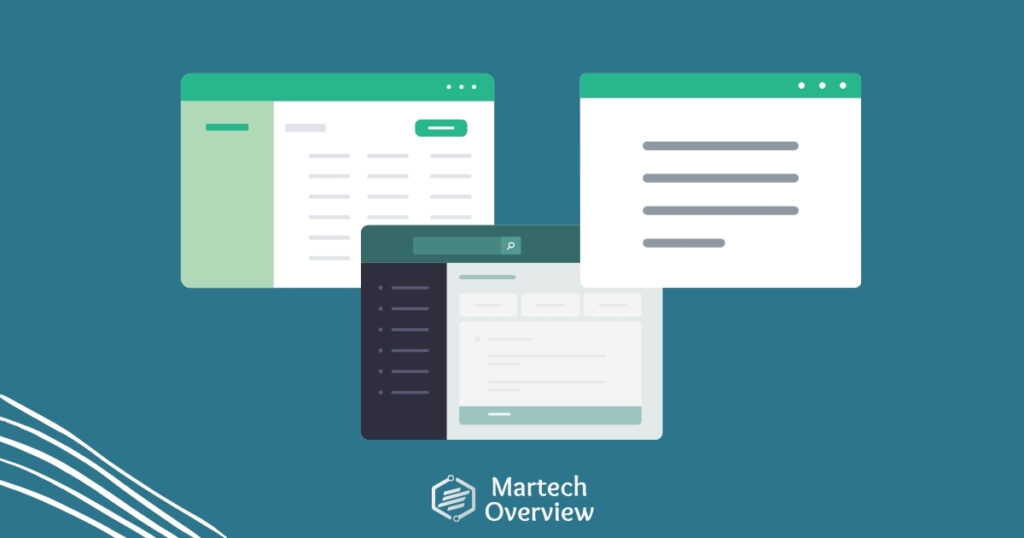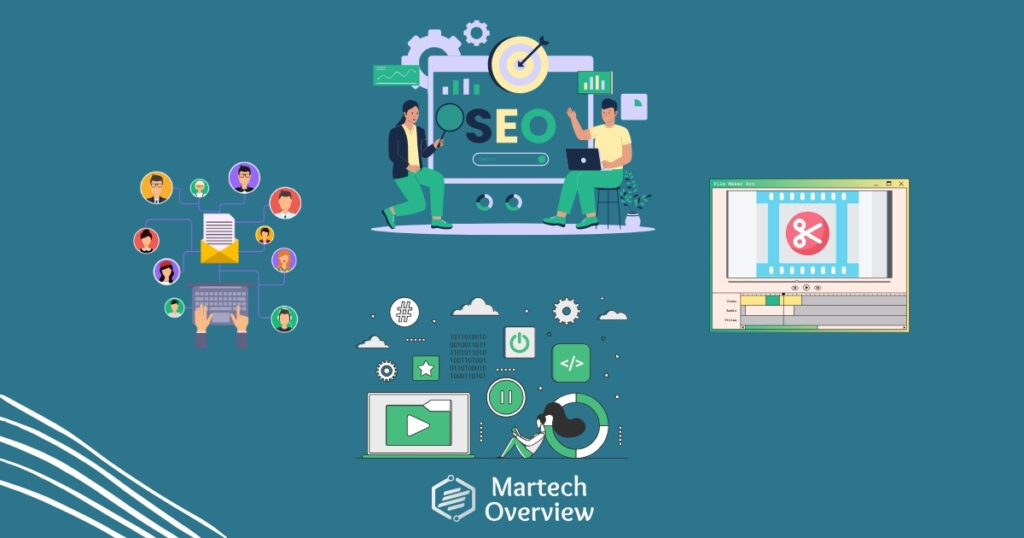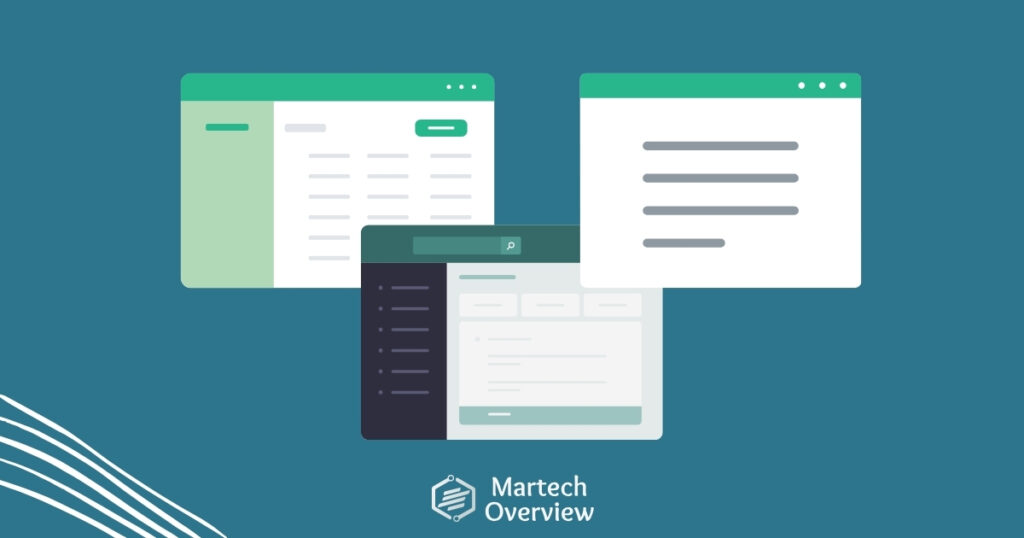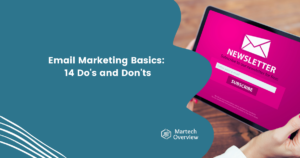Marketing technology, or in short Martech, is like having a secret weapon in your marketing arsenal. With the right tools, you get to improve and speed up most of your daily tasks.
Surely you’ve been using some sort of martech in your day-to-day even without knowing it: either when setting up your content, email campaigns, preparing a podcast, tweaking a few quick designs, or setting up any campaigns in general
So, what is it exactly and how can it become your superpower? Grab a cup of coffee, get cozy, and let’s dive into the wonderful world of Martech together!
You’ll find out:
- What is Martech?
- Benefits of Marketing Technology
- Martech vs. Adtech vs. SaaS: What’s the Difference?
- Types of Martech
- Choosing the Right Martech
- Wrapping Up
What is Martech?
Alright, let’s break it down. Martech is basically the happy marriage of marketing and technology with the common goal of efficiency. It’s all about using tech tools and platforms to supercharge your marketing efforts.
Think of it as the wizard behind the curtain, pulling all the strings and making the magic happen.

From email marketing and social media management to customer relationship management (CRM) and analytics, martech covers a wide range of tools and software designed to streamline and optimize every aspect of your marketing strategy.
Benefits of Marketing Technology
Now, you might be wondering, why bother with martech when good old-fashioned marketing seems to be doing just fine? Well, here are just a few of the amazing benefits of using marketing technology:
- Efficiency: Martech automates repetitive tasks, freeing up your time to focus on more important things, like brainstorming your next viral campaign or improving your content plan.
- Personalization: With martech, you can tailor your marketing messages to specific audiences, delivering a more personalized experience throughout multiple channels. Moreover, you get information on what resonates with your customers on a deeper level. It’s like having a direct line to their consumer behavior, instead of going through significantly more trial and error stages.
- Insights: Martech provides invaluable insights into your audience’s behavior and preferences, allowing you to make data-driven decisions that get results much faster, and with less hassle. Say goodbye to guesswork and hello to cold, hard facts. For example, the right tool will analyze and point out what content resonates with your audience, or what your competition does better than you.
- Scalability: Whether you’re a small startup or a global enterprise, martech can scale with your business, adapting to your needs and helping you grow faster than you ever thought possible. Most tools have several pricing plans that can appease a business from start-up to enterprise.
Martech vs. Adtech vs. SaaS: What’s the Difference?
Alright, let’s clear up some confusion. Martech, Adtech, and SaaS (Software as a Service) are often used interchangeably, but they’re not quite the same thing. Here’s a quick rundown.

As we’ve already established, martech focuses on using technology to enhance marketing efforts. It encompasses a wide range of tools and platforms specifically designed for marketing activities.
Adtech, on the other hand, is all about advertising technology. It’s specifically geared toward managing and optimizing online advertising campaigns, including display ads, video ads, and sponsored content.
And then we have the parent, so to speak. SaaS refers to software that is hosted in the cloud and accessed via the Internet. While the majority of martech and adtech tools are delivered via the SaaS model, not all SaaS products are necessarily martech or adtech.
Types of Martech
Now that we’ve got the basics down, let’s explore some of the most common types of martech tools and platforms.

- Email Marketing Software: From crafting engaging newsletters to automating drip campaigns, email marketing software helps you stay connected with your audience and drive conversions.
- Social Media Management Tools: These tools allow you to schedule posts, monitor engagement, and analyze performance across multiple social media platforms, making it easier to manage your brand’s online presence.
- Video and Design Platforms: These platforms offer robust features for video editing, graphic design, and visual content creation, empowering marketers to produce captivating multimedia content that drives engagement and enhances brand identity. Whether crafting promotional videos, designing social media graphics, or developing interactive presentations, these apps unleash creativity and elevate marketing efforts even if you’re not a pro at design or editing.
- Content Management Systems (CMS): CMS platforms like WordPress and Drupal make it easy to create, publish, and manage content on your website, helping you attract and engage your target audience.
- Customer Relationship Management (CRM): CRM systems are the backbone of many marketing operations, helping businesses track interactions with leads and customers, manage sales pipelines, and nurture relationships over time. They provide valuable insights into customer behavior and preferences, enabling personalized marketing campaigns and targeted communication strategies.
- Analytics Platforms: Analytics platforms like Google Analytics, Ahrefs, or Semrush provide valuable insights into website traffic, user behavior, campaign performance, or even competitor information, empowering you to optimize your content marketing and SEO efforts for maximum impact.
Choosing the Right Martech
With so many martech options out there, how do you choose the right one for your business? Here are a few tips to help you navigate the maze of marketing technology:
1. Define Your Goals
Before you start shopping for martech solutions, take some time to clearly define your marketing goals and objectives. What are you trying to achieve? What metrics will you use to measure success?
Most marketing software offers an array of features, some more complex than others, some better developed than others.
Often times marketers can pick a very popular software, but end up not using it to its full potential (while paying a steep price), or find out that the features they use the most are lacking in comparison to others.
Write everything down and prioritize your needs. That’s a good starting point for narrowing down what you actually need from a tool.
2. Think Long-Term Needs
Once you have your priorities straight, take a look at your long-term goals as well. As your business grows and evolves, your martech needs are likely to change as well.
Try to choose scalable solutions that can grow with your business and adapt to your changing needs over time, or look at options to help you achieve the projects you’d like to do in the future.
A good fit in terms of marketing software might even free up some time and advance the timeline for those projects.
3. Do Your Research
Once you know what you’re looking for, research different martech vendors and platforms to find their strongest and weakest features, available pricing plans, and overall how other professionals are using them.
Read reviews to see if customers are satisfied, ask for recommendations, and take advantage of free trials or demos whenever possible. Sites like G2 or Capterra are also helpful in finding out how well a SaaS performs.
4. Define Your Budget
Pricing is a significant factor when selecting martech tools. While some platforms offer a free basic version or trial period, others require a monthly or annual subscription fee.
Consider your budget constraints and evaluate the pricing plans of different vendors, while still balancing what you get for your money on a point-by-point basis.
Decide if it’s with investing in a paid plan, and if so, which company has the plan that is best suited for your specific needs.
5. Understand Pricing Models
Beyond the initial cost, understand the pricing models of martech solutions. Some may charge based on usage, number of users, or features included.
Pay attention to any hidden costs or potential price hikes down the road. Opt for transparent pricing structures that align with your long-term financial strategy.
6. Consider Integration, Suite Tech, or Point Solutions
Suite tech refers to integrated marketing technology platforms that offer a comprehensive suite of tools and functionalities within a single platform, while point solutions are individual, specialized marketing tools or platforms that address specific marketing tasks or channels.
Simply put, you might be interested in software that only offers social media scheduling and posting (point solution). However, you might need a tool that also offers analytics for content performance, customer relationship management to streamline the approval process, competitor analysis, etc (suite solution).
You’ll also need to think about how your martech stack will integrate with your existing tools and systems. Look for solutions that offer seamless integration with your CRM, email marketing software, and other essential tools to further streamline your tasks.
7. Test the User Interface (UI) and User Experience (UX)
Take the time to explore the user interface of each martech tool you’re considering. Look for an overview of the dashboard and overall organization of the app.
Is it visually appealing? Can you easily find the features you need and is it intuitive? Pay attention to the layout, typography, and overall design aesthetics.

Look for tools with intuitive navigation, clear workflows, and customizable dashboards. Consider whether the platform offers training resources or onboarding assistance to help your team quickly adapt to the new software.
A well-designed UI and UX create a positive general user experience. Still, sometimes the choice can be personal to the way you and your team need to use it and your style of organizing everything. Remember, if it’s complicated or cumbersome to use, your team may resist adopting it.
8. Don’t Forget About Support
Last but not least, consider the level of support and training offered by each martech vendor, as it will count towards how quickly and successfully you can integrate it into the workflow.
The more features a software offers, the harder it might be to understand its true potential and use case.
Look for companies that provide responsive customer support, comprehensive documentation, and ongoing training opportunities to help you get the most out of your investment.
Wrapping Up
And there you have it! A crash course in martech and why you should be using it to take your marketing game to the next level. Whether you’re a seasoned marketing pro or just dipping your toes into the world of digital marketing, martech has something to offer everyone.
By carefully considering these factors you can confidently select martech solutions that align with your goals, budget, and user preferences.
Remember, the right martech stack is not just about the features it offers but also about how well it integrates into your existing workflows and enhances the overall efficiency and effectiveness of your marketing efforts.



